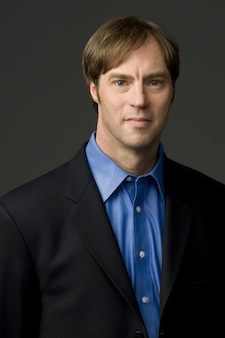 Evolution
Evolution
 Intelligent Design
Intelligent Design
On the Medved Show, Evolutionary Biologist "Greg" Takes Up the Mantle for Darwinists and Attempts to Debate Stephen Meyer
 Congratulations to self-identified evolutionary biologist "Greg" in South Florida who showed his colleagues that yes, you can go ahead and try to debate Stephen Meyer about his new book, Darwin’s Doubt, and he won’t bite your head off. True, to select another metaphor, he may wipe the floor with you. But very politely.
Congratulations to self-identified evolutionary biologist "Greg" in South Florida who showed his colleagues that yes, you can go ahead and try to debate Stephen Meyer about his new book, Darwin’s Doubt, and he won’t bite your head off. True, to select another metaphor, he may wipe the floor with you. But very politely.
We hope this will give courage to Jerry Coyne at the University of Chicago. Writing last week at Why Evolution Is True, he complained about his fellow Darwin true believers not being able to post their criticisms of intelligent design here at ENV. We then invited Dr. Coyne to debate us in this space and say what he wants about ID (excluding ad hominem attacks). We offered to send him a free copy of Darwin’s Doubt and let him review it here. No response from Coyne.
Anyway, Steve Meyer was on the Science & Culture Update today, a weekly feature on the Michael Medved Show. That was a remarkably content-filled hour. It may be the first time in history that Hox genes came up for conversation on a nationally syndicated radio talk program with 3.5+ million weekly listeners.
The basic argument of Darwin’s Doubt is that undirected Darwinian processes cannot explain the eruption of complex animal life that occurred in a narrow window of 5-10 million years, some 530 million years ago. Instead, evidence points to a designing agent at work.
Greg from South Florida called up the show and was put on the air with Michael Medved and Steve Meyer. He somewhat self-importantly, I thought, identified himself as an evolutionary biologist.
Greg seemed to think Meyer was saying that all life, period, had originated in the Cambrian. First, Greg tried to wave ancient sponges in Dr. Meyer’s face, very simple organisms that came earlier. But Meyer pointed out that no one thinks sponges are ancestral to, say, arthropods — e.g., trilobites with their fantastically well-developed compound eyes that pop into the fossil record without precedent or predecessor. The whole question at issue here is how to account for the springing into existence of phyla that have no evident ancestors. Gesturing to sponges doesn’t help that.
Greg then asked how come no humans, rabbits, or trees appear in the Cambrian strata. Huh? Steve Meyer politely said he was not quite able to grasp the point of that question.
If I caught and transcribed his words correctly, Greg said that he thought it is "disingenuous to say ‘Scientists don’t understand the Cambrian. Therefore creation.’" It seemed that Greg didn’t know what "disingenuous" means. Certainly, it would be silly to say "’Scientists don’t understand the Cambrian. Therefore creation" — a variation on Dr. Coyne’s prepublication pr�cis of Darwin’s Doubt as "Yes, baby Jesus made the phyla!" But Steve Meyer, obviously, says none of those things.
Greg went on to scorn the idea that Steve Meyer could attribute the origin of simple or complex life to "magical progression" — I think he meant intervention — "by an intelligent designer." Meyer then patiently explained that the word "magical" is pejorative and irrelevant to the scientific challenge from ID. Greg hit back with the assertion that actually Darwinian evolutionists have got everything all figured out because of Hox genes.
Talk radio is wonderful, but it does have its limitations. One is time. Greg was not able to elaborate his final challenge before the commercial break cut in. However you can find Stephen Meyer’s refutation of the "What about Hox genes?" objection on pp. 317-321 of Darwin’s Doubt.
